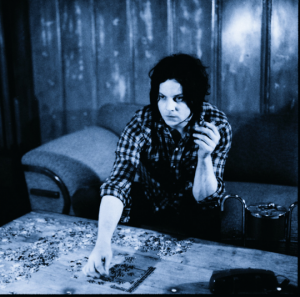Album Review: Jack White's Blunderbuss
Jack White has had quite the career. From wild success with The White Stripes, to multiple acclaimed smaller groups (namely The Raconteurs and The Dead Weather) to collaborations with the likes of Insane Clown Posse and Alicia Keys. Not to mention he runs a record label, Third Man Records, and has...
 Jack White has had quite the career. From wild success with The White Stripes, to multiple acclaimed smaller groups (namely The Raconteurs and The Dead Weather) to collaborations with the likes of Insane Clown Posse and Alicia Keys. Not to mention he runs a record label, Third Man Records, and has just been slated to compose music for Johnny Depp’s new movie, “The Lone Ranger”. So it’s safe to say that when he announced he would be releasing a solo album, the expectations were pretty high.
I’ll be honest here, I was a little let down after the first listen. Jack White, the first garage rock guitar player I ever heard, ripped my virgin ears to shreds with 2003’s Elephant and I loved every minute of it. He stole my heart with the surprisingly emotional “You’ve Got Her in Your Pocket” and the Raconteur’s “Together”. He utterly delighted me in 2007 with Icky Thump’s “Conquest” (which remained my ringtone for much of my high school career) and the popular “Steady as She Goes”. Recently, it seemed like he was showing up everywhere with everyone, playing every instrument. So finally, finally he decides to release a solo album. Jack White, on his own, unfettered, with no one to hold him back.
With expectations like that, I was bound to be a little disappointed. But I have to say this album is growing on me. Instead of the in-your-face insane riffs and at times absurd lyrics of the White Stripes, or the straightforward story telling of the Raconteurs, White presents the world with a subtle, slightly more subdued work of art.
Blunderbuss, or as I like to call it, Jack White Sings about Women, exemplifies some of White’s best qualities. He can shred on the guitar for minutes at a time without boring anyone, he can write lyrics that make absolutely no sense but sound perfect, and, perhaps one of his best talents, he can write about deep, personal emotions while admitting nothing.
White writes about love, loss, and obsession from all sides of the issues. He sings of a girl who doesn’t care how much she hurts him as she “cut off the bottom of [his] feet, made [him] walk on salt.” He obsessively thinks about a girl that all the boys seem to be after in school, but then wonders “who’s jealous of who?” He writes of the “men that fall so deep in love they start to weep themselves to sleep” but then complains that “sometimes someone controls everything about you when they tell you they can’t live without you” when a woman literally takes parts of his body with her after they break up.
It is hard to get a good idea of when White is writing from his own life, and how he actually feels about it. The closing track alludes to his recent divorce with singer Karen Elson with lines like “take me with you when you go girl, take me anywhere you go,” and distress about the realization that “helping yourself could be hurting or harming someone else,” but lacks the emotional power of The White Stripes’ “I Just Don’t Know What to Do with Myself.” On one of the most upbeat and surprisingly cutting songs on the album, “Hip (Eponymous) Poor Boy,” White clearly calls out former bandmate/wife/sister Meg by saying “you’ll be watching me girl, taking over the world. Let the stripes unfurl.”
Musically, White is experimenting. There’s a surprising amount of piano on the album, including funky keyboard bits and the jazzy riff on the closing song. Fiddles, clarinets, mandolins, and violins sound throughout the tracks, but the album as a whole lacks musical coherency. And where are the ear-shattering guitar riffs we have all come to know and love Jack White for? Blunderbuss seems to be Jack White’s foray into different genres (jazz, blues, even country) and styles, but leaves listeners wondering which one White liked best.
In the end, this album will be remembered as a great introduction to Jack White as a solo artist. Despite the experimentation, the album at times harkens back to the intense rock of The White Stripes days, but still shows White’s growth as an artist. And he’s still growing–despite what critics have to say. In one of the most poignant lines on the album, White says “the people around me won’t let me become what I need to, they want me the same.” Luckily for us, he doesn’t let what other people want stop him from anything at all.
Jack White has had quite the career. From wild success with The White Stripes, to multiple acclaimed smaller groups (namely The Raconteurs and The Dead Weather) to collaborations with the likes of Insane Clown Posse and Alicia Keys. Not to mention he runs a record label, Third Man Records, and has just been slated to compose music for Johnny Depp’s new movie, “The Lone Ranger”. So it’s safe to say that when he announced he would be releasing a solo album, the expectations were pretty high.
I’ll be honest here, I was a little let down after the first listen. Jack White, the first garage rock guitar player I ever heard, ripped my virgin ears to shreds with 2003’s Elephant and I loved every minute of it. He stole my heart with the surprisingly emotional “You’ve Got Her in Your Pocket” and the Raconteur’s “Together”. He utterly delighted me in 2007 with Icky Thump’s “Conquest” (which remained my ringtone for much of my high school career) and the popular “Steady as She Goes”. Recently, it seemed like he was showing up everywhere with everyone, playing every instrument. So finally, finally he decides to release a solo album. Jack White, on his own, unfettered, with no one to hold him back.
With expectations like that, I was bound to be a little disappointed. But I have to say this album is growing on me. Instead of the in-your-face insane riffs and at times absurd lyrics of the White Stripes, or the straightforward story telling of the Raconteurs, White presents the world with a subtle, slightly more subdued work of art.
Blunderbuss, or as I like to call it, Jack White Sings about Women, exemplifies some of White’s best qualities. He can shred on the guitar for minutes at a time without boring anyone, he can write lyrics that make absolutely no sense but sound perfect, and, perhaps one of his best talents, he can write about deep, personal emotions while admitting nothing.
White writes about love, loss, and obsession from all sides of the issues. He sings of a girl who doesn’t care how much she hurts him as she “cut off the bottom of [his] feet, made [him] walk on salt.” He obsessively thinks about a girl that all the boys seem to be after in school, but then wonders “who’s jealous of who?” He writes of the “men that fall so deep in love they start to weep themselves to sleep” but then complains that “sometimes someone controls everything about you when they tell you they can’t live without you” when a woman literally takes parts of his body with her after they break up.
It is hard to get a good idea of when White is writing from his own life, and how he actually feels about it. The closing track alludes to his recent divorce with singer Karen Elson with lines like “take me with you when you go girl, take me anywhere you go,” and distress about the realization that “helping yourself could be hurting or harming someone else,” but lacks the emotional power of The White Stripes’ “I Just Don’t Know What to Do with Myself.” On one of the most upbeat and surprisingly cutting songs on the album, “Hip (Eponymous) Poor Boy,” White clearly calls out former bandmate/wife/sister Meg by saying “you’ll be watching me girl, taking over the world. Let the stripes unfurl.”
Musically, White is experimenting. There’s a surprising amount of piano on the album, including funky keyboard bits and the jazzy riff on the closing song. Fiddles, clarinets, mandolins, and violins sound throughout the tracks, but the album as a whole lacks musical coherency. And where are the ear-shattering guitar riffs we have all come to know and love Jack White for? Blunderbuss seems to be Jack White’s foray into different genres (jazz, blues, even country) and styles, but leaves listeners wondering which one White liked best.
In the end, this album will be remembered as a great introduction to Jack White as a solo artist. Despite the experimentation, the album at times harkens back to the intense rock of The White Stripes days, but still shows White’s growth as an artist. And he’s still growing–despite what critics have to say. In one of the most poignant lines on the album, White says “the people around me won’t let me become what I need to, they want me the same.” Luckily for us, he doesn’t let what other people want stop him from anything at all. 
